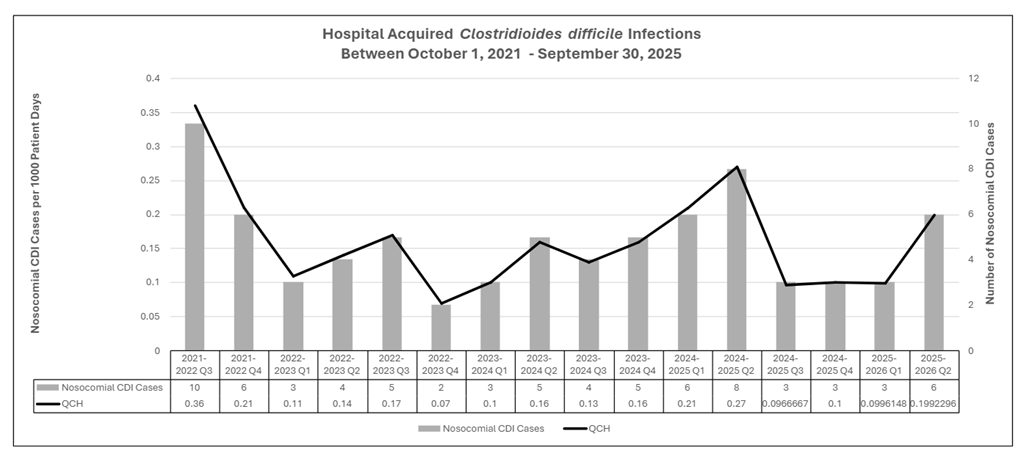Queensway Carleton Hospital takes your care and your safety very seriously, and we are committed to transparency. Our C.difficile infection rates are posted each month.
About C.difficile
What are hospital-acquired infections?
Sometimes when patients are admitted to the hospital, they can get infections. These are called hospital-acquired infections. In the case of C.difficile, this may mean that symptoms began 72 hours after admission to the hospital; or that the infection was present at the time of admission but was related to a previous admission to that hospital within the last four weeks.
What is C.difficile?
C.difficile is a bacteria. C.difficile can be part of the normal bacteria in the large intestine and is one of the many bacteria that can be found in stool (a bowel movement). A C.difficile infection occurs when other good bacteria in the bowel are eliminated or decreased allowing the C.difficile bacteria to grow and produce toxin. The toxin produced can damage the bowel and cause diarrhea.
C.difficile is one example of a hospital-acquired infection and is one of the most common infections found in hospitals and long-term care facilities. C.difficile has been a known cause of healthcare-associated diarrhea for more than 30 years.
Who is at risk for C.difficile?
Healthy people are not usually susceptible to C.difficile. Seniors, and people who have other illnesses or conditions being treated with antibiotics and certain other stomach medications, are at greater risk of an infection from C.difficile.
What are the symptoms of C.difficile?
The usual symptoms are mild but can be severe. Main symptoms are watery diarrhea, fever, abdominal pain /tenderness. In some cases there may not be diarrhea. Blood may or may not be present in the stools.
How do you get C.difficile?
C.difficile is the most common cause of hospital associated infectious diarrhea. Since it can be part of the normal bacteria that live in the large intestine, taking antibiotics can change the normal balance of bacteria in your large intestine making it easier for C.difficile to grow and cause an infection. Old age and the presence of other serious illnesses may increase the risk of C.difficile disease.
How does C. difficile spread?
When a person has C.difficile, the germs in the stool can soil surfaces such as toilets, handles, bedpans, or commode chairs. When touching these items, your hands can become soiled. If you then touch your mouth, you can swallow the germ. Your soiled hands can spread germs that can survive for a long time on other surfaces if not properly cleaned.
The spread of C.difficile occurs due to inadequate hand hygiene and environmental cleaning; therefore, proper control is achieved through consistent hand hygiene and thorough cleaning of the patient environment. Good hand hygiene i.e. washing hands thoroughly and often is the single most effective way to prevent the spread of infectious diseases like C.difficile.
At Queensway Carleton Hospital, we are committed to promoting hand hygiene for patient care. We provide access to alcohol-based hand products as well as soap and water throughout the facility for staff, patients, and visitors to use. We have a process to audit the hand hygiene of staff members and provide feedback. We follow the advice and practices in the Ontario “Just Clean Your Hands” campaign to help us provide best practices in hand hygiene in caring for our patients.
How is C.difficile diagnosed?
C.difficile is usually diagnosed by sending a specimen of diarrhea to the laboratory where it is tested for the presence of the C.difficile toxin.
How is C.difficile treated?
Treatment depends on how sick you are. People with mild symptoms may not need treatment. For more severe diseases, antibiotics are required.
How does Queensway Carleton Hospital control the spread of C.difficile?
In order to prevent the spread of C.difficile, we engage our environmental services team to ensure that they are following the best practices for cleaning, especially in situations where patients are identified with C.difficile. We strongly encourage our staff to practice proven hand hygiene routines. We ensure that patients who are suspected or proven to have C.difficile receive appropriate treatment as soon as possible. Once diarrhea has stopped in a patient with C.difficile, there is a much lower risk of contamination that might cause further cases.
Does Queensway Carleton Hospital track C.difficile cases?
Looking closely at the C.difficile cases is an important step in making sure you are safe. We track the number of C.difficile cases each month and the rates are posted below.
C.difficile Rates 2021-2025
